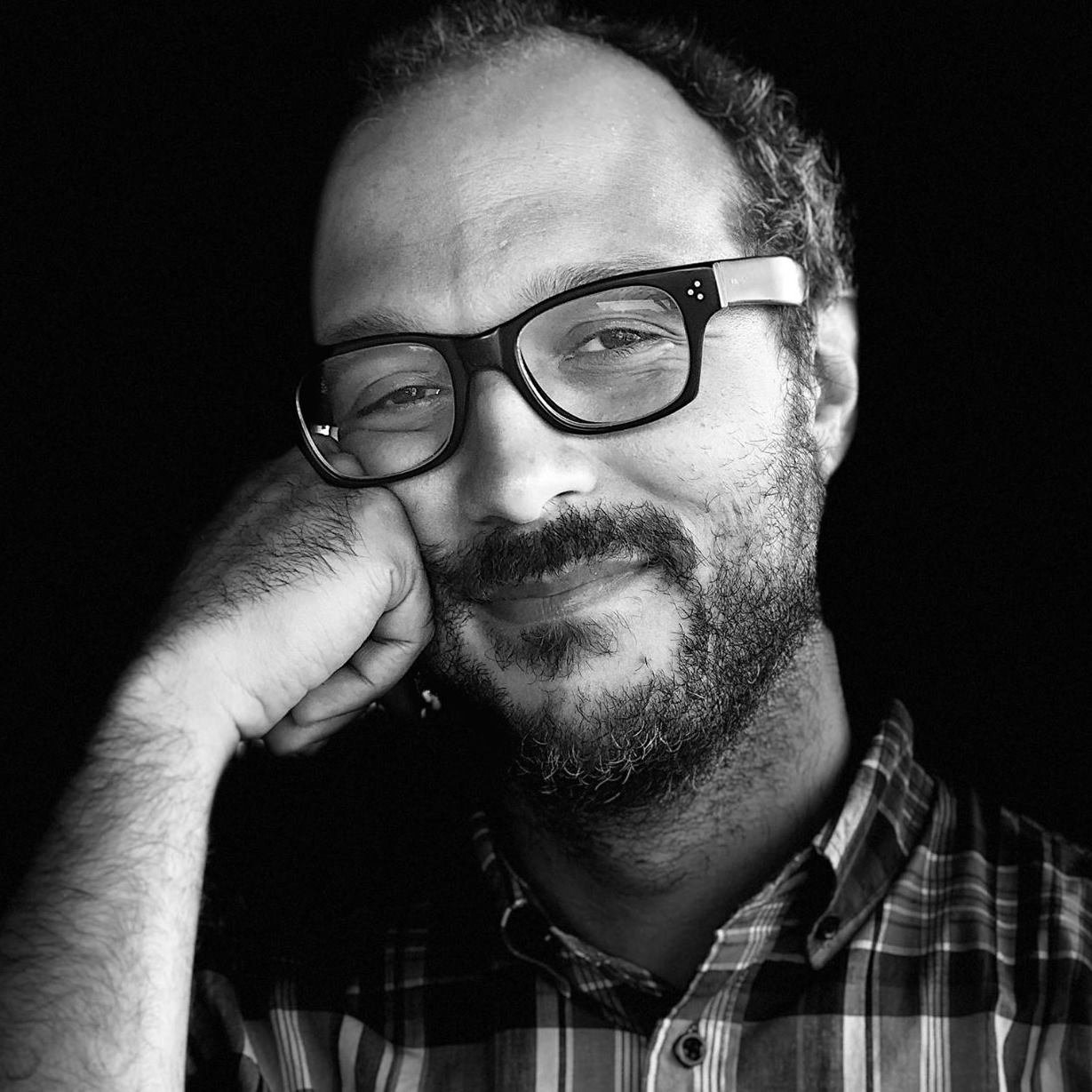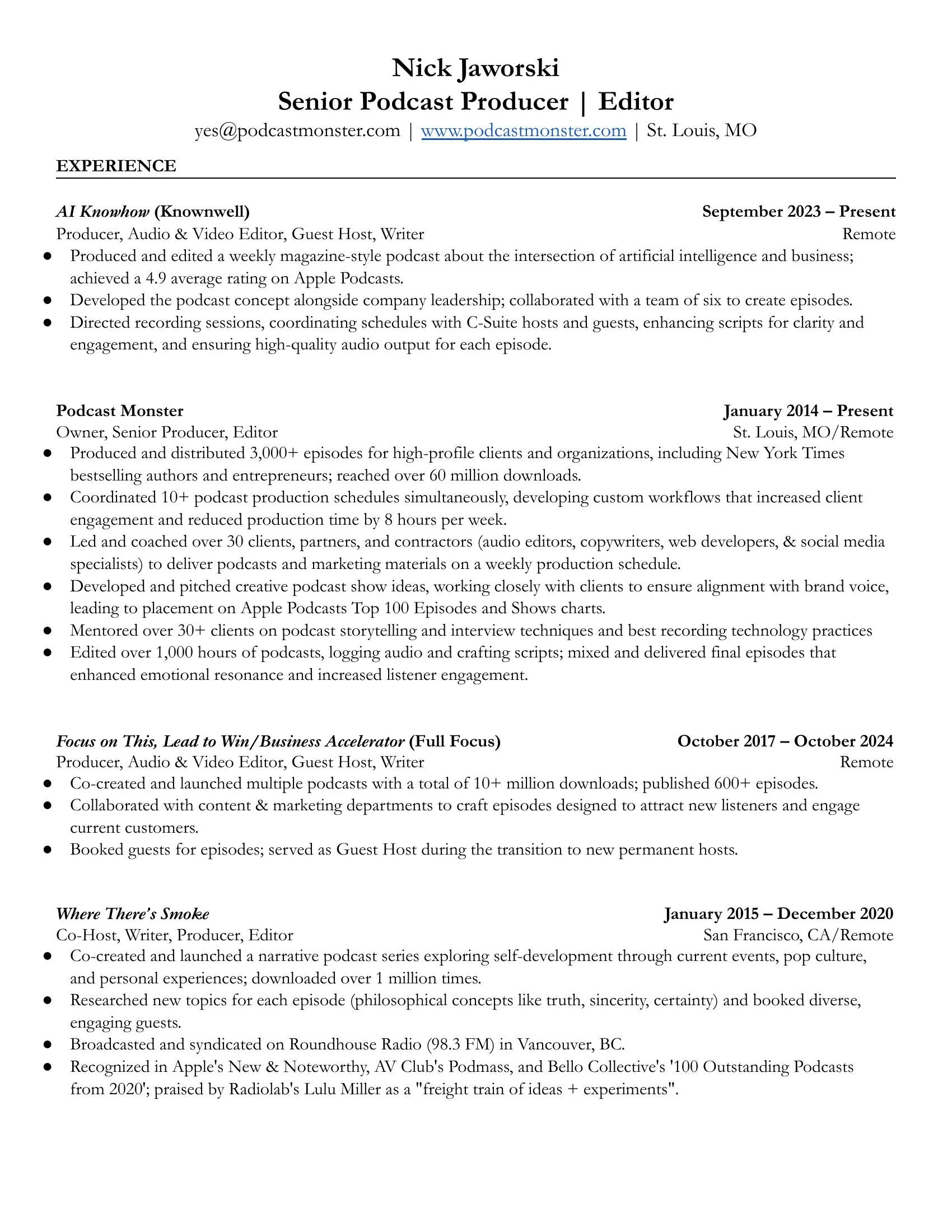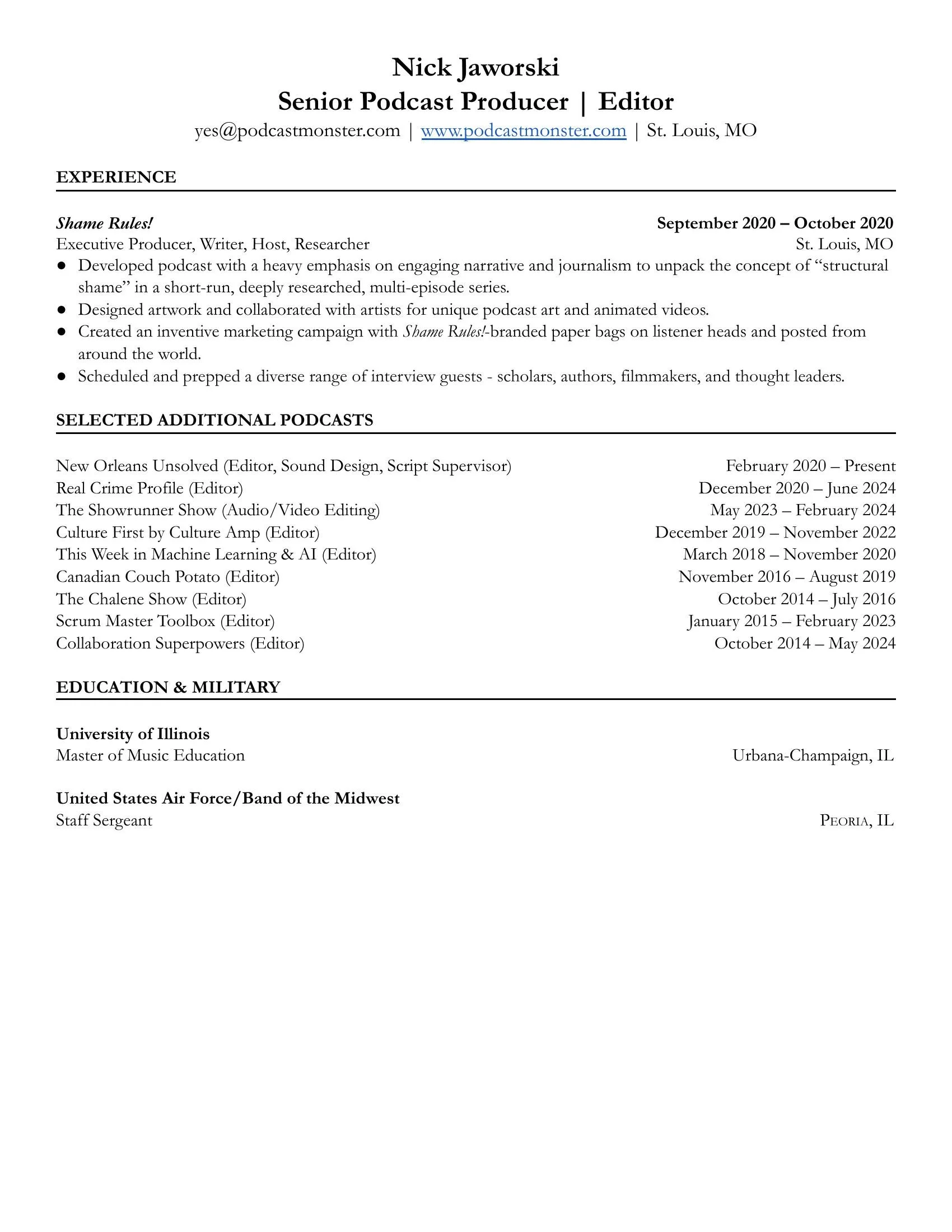Meet Nick,
Your friendly neighbor podcast producer and editor
Who is Nick?
Experienced Podcast Producer & Editor with 10 years of crafting narrative-driven audio that captivates audiences. Having produced 3,000+ episodes with 60+ million downloads, Nick combines vision, research skills, technical expertise, and thoughtful storytelling to deliver polished, memorable shows that excite the production crew and resonate with listeners.
For shame.
Perhaps the best example of my abilities as a writer, editor, and producer is my passion project, Shame Rules!
I spent over two years researching and developing the show while juggling client work that actually paid the bills. These episodes reflect my ability to draw listeners into a story and guide them as they poke around, ask questions, and uncover deeper ideas.
Hear Here.
I’ve created a short podcast demo with some examples of my work. Feel free to listen to the whole thing or skip around to listen to specific sections.
See here.
Over the last decade, most podcasts have shifted to video. This is a smart strategy for leveraging the YouTube discovery algorithm. Here are a couple of examples of what I’ve been up to.
Writing Samples
Here’s a curated collection of writing samples showcasing my work as a producer. Each piece highlights my ability to craft compelling narratives, develop engaging content, and shape the tone and direction of a show. These examples reflect my experience in storytelling, scriptwriting, and guiding episodes from concept to completion.
-
This is the closing to an episode of Shame Rules! that explores the ways that parades have transitioned as blunt tools of punishment and upholding the status quo and morphed into celebrations of individual liberty and community.
Nick Jaworski: Just think about the story we started this episode with, and think about the way that shame has been used. People have been physically dragged out from their homes and shamed by their own community for things big and small—right or wrong—for just looking or acting or being different in some way. They've been placed backwards on a horse, put in the stocks, placed in an iron mask, paraded, and made an example of on their way to meet their maker.
You know, the “shame parade” was a powerful tool of communities, the church, the state. But over time, some people pushed back against the idea of the shame parade. They pushed back against the idea that being seen itself was shameful.
And I'm highlighting these early parades because very quickly they would be known as Pride Parades. But the ideas that they used to get started—they didn't come up with them on their own. People had been doing this work for a while.
Eric Marcus: This didn't take place in a vacuum. It was in the late 1960s when there was an enormous explosion of protests—Black civil rights movement, the anti-war movement, the women's movement, challenges to societal norms of all kinds.
Nick Jaworski: And so I find these stories of marginalized and oppressed people taking parades and subverting them into acts of strength and pride as something truly brave and also truly beautiful. I just don't have other words for it.
[Music]
Most of the audio in this part of the show is from an amazing record that a man named Breck Ardery made in 1970, and so we get to hear about these first marches and how inspiring they were to the participants themselves. They didn't know that 50 years later, Pride Parades would be all over the planet, in every state in America, and that in one year, 2.5 million people would participate in the New York Pride Parade alone.
I'm gonna let the final three minutes of Breck's audio documentary play out in its entirety because it's perfect. And as you listen, think about how far these parades have come from just being weapons of shame for those in charge, and how effective and important these parades have become for creating both pride and real change.
-
NOTE: This is the closing to a short exploration of the explosive viewership growth that The Hallmark Channel experienced between 2016 and 2020. Most of this segment is available to hear in the portfolio section. (This is from episode 82 of Where There’s Smoke.)
This brings me back to one more Hallmark Christmas rule. According to those anonymous writers, in order to have Hallmark approve your Christmas script, you can’t have too much conflict. At any point.
The writers say that you can’t use words like “hate” or “crazy” or “stupid.” Everything has to be “Hallmark-ified,” which means that Hallmark movies offer nothing in terms of surprises. In fact, you know the end of the movie at precisely the same time you’re watching the start of the movie.
That’s a real Interstellar paradox, but that’s also the point, right?
The thing that Hallmark movies provide is certainty. You know what’s going to happen the literal moment you meet the main character, and most importantly, you know that everybody in that movie will be okay.
Despite being produced in 2020, none of the 40 new Hallmark movies has anybody wearing a mask. Nobody mentions the pandemic. Nobody is denying the results of an election.
In a world that’s so good at surprising and scaring us, we just don’t have much emotional energy left to gamble on uncertain outcomes. A Hallmark movie is a sure bet. You can sit down and know that for the next two hours, at least, the world simply isn’t what it is. It’s this other thing that feels nice and smells like cinnamon.
-
This Shame Rules! excerpt is taken from the episode “Purity”. It’s a look at the ways that American history and late 1990s Evangelicalism collided in unique ways. The entire episode can be found here.
MTV Announcer (Clip): Ladies and gentlemen, please welcome to the 2008 MTV Video Music Awards, your host, Russell Brand.
Russell Brand (Clip): Thank you very much. Hello, welcome to the MTV VMAs 2008, live from the Paramount Lot. Welcome, all of you.
Nick Jaworski: It's September 7th, 2008, near the very end of the George W. Bush administration, and Russell Brand is hosting the MTV Video Music Awards.
Now, the VMAs have never been confused with the Oscars, or a Nobel Peace Prize ceremony, or even the boozy Golden Globes. No, the VMAs are different. They're supposed to be edgy, irreverent, unpredictable—like that kind of manufactured unpredictable. Well, this particular ceremony in 2008 is just one year away from one of the 21st century's loudest pop culture touchpoints:
Kanye West (Clip): Now Taylor, I'm really happy for you, I'm gonna let you finish, but Beyoncé had one of the best videos of all time. One of the best videos of all time!
Nick Jaworski: Anyway, back in 2008, host Russell Brand makes a few jokes poking fun at the fact that the Jonas Brothers chose to wear purity rings to signify that they were going to wait until marriage to have sex.
Russell Brand (Clip): In case you were unaware, each of the Jonas Brothers does wear a tiny ring as a mark of their commitment to God. I'd take it a little bit more seriously if they wore it on their genitals. And also, it's a little bit ungrateful 'cause they could literally have sex with any woman that they want—they’re just not gonna do it. That is like Superman just deciding not to fly and to go everywhere on a bus.
Nick Jaworski: And the thing is, back in 2008, the Jonas Brothers' choice to wear purity rings wasn't particularly unique. Demi Lovato, Hilary Duff, Miley Cyrus, Selena Gomez, and others all either wore purity rings or publicly talked about their decision to not have sex before marriage. And if you notice that all of those people had TV shows on Disney, then congratulations—you’re a pop culture gumshoe. I would like to point out that we don't have time to talk about it, but it's not a coincidence.
Okay, so back to the VMAs.
MTV Announcer (Clip): Please welcome John Legend and Jordin Sparks.
Nick Jaworski: Later that night, after Russell Brand's comments, American Idol winner Jordin Sparks walked onto the stage with future Sexiest Man Alive, John Legend, to introduce a performance by T.I. Some of you should be pretty close to filling out your 2008 Bingo card. But before reading the teleprompter, Jordin took a moment to fire back against what she perceived as an attack on the brothers Jonas, and purity culture at large.
Jordin Sparks (Clip): Alright, I just have one thing to say about promise rings. It's not bad to wear a promise ring 'cause not everybody—guy or girl—wants to be a slut, alright? So anyway, when you live your life in public, your story could overshadow your music. But the next performer transcends...
Nick Jaworski: In another room—also during the George W. Bush administration—is a 23-year-old woman named Linda. Like Jordin Sparks, Linda has pledged her purity, but unlike Jordin Sparks, she's not presenting at the VMAs. She's in a very un-MTV medical clinic about to get a routine X-ray.
Linda Kay Klein: You know, before you take an X-ray, you're often asked—or I think you should always be asked—if there's any chance you could be pregnant. And I remember thinking to myself, "Oh God, what if I'm pregnant?" Right? And then she was like, "Well, let's, you know, we can give you a test." And I was like, "Okay, great, great, great." So I took a test. I wasn't pregnant. And then she said, "Okay, let's get you on some birth control pills then." And I was like, "Oh, no, no, I'm already on birth control pills." And she looked at me like, "Why are you taking a pregnancy test?" Little did she know, I also was not having sex.
The Pre-Interview
or
“The Section Where Nick Answers Questions from
Applications To Save Everybody A Bunch of Time
(And To See How Humble He Is, Obviously).”
-
I love research! I love it so much that, during graduate school, I completed coursework for an additional Master’s degree in Communication. Over the past 10 years, I’ve researched countless topics and sent countless cold emails to get the guests I need.
-
I’ve written or collaborated on hundreds of scripts with partners and clients. I’ve spent hundreds (if not thousands) of hours helping clients find their voice - both in written scripts and live, remote performance coaching.
-
I LOVE Descript and was an early adopter. I’m still on a legacy plan and use it daily. Coming from a time when editing meant tracking timestamps and juggling files, Descript has been a game changer. (No, they’re not paying me to say that… but maybe they should.)cription text goes here
-
After Descript, my next stop is Adobe Audition (unless I’m cleaning audio with iZotope RX). I’ve been using Audition for 10 years to fine-tune podcasts and deliver polished episodes.
-
I’ve been working remotely with individuals and organizations long before it was trendy. I thrive in passionate, creative teams. My background as a public school teacher helps me guide teams, keep them motivated, and move projects forward.
-
Over the past decade, I’ve overseen the production of more than 3,000 episodes, each with its own unique demands. I’ve got this.
-
This is one of the most enjoyable parts of the process - finding the right people to connect your episode’s question to its answer. Pre-interviews are a great chance to prepare guests, not just with information but with enthusiasm. I genuinely excel at building relationships through email and Zoom.
-
As a teacher and small business owner for 10 years, I’ve provided feedback on everything from edits and delivery to music, scripts, and story structure.
-
I’ve got 10+ years of podcast production experience, along with years of teaching music technology.
-
Where There’s Smoke explored “self-development through the lens of current events, pop culture, and experience.” Each episode used pop culture as a launchpad for deeper conversations, giving me unique experience in using pop culture to craft engaging, meaningful narratives.
-
My grad school advisor used to say, “You’re so good with a cold email.” I enjoy reaching out to experts, building relationships, and securing amazing guests.
-
Clients often praise this as my strongest skill. I blend formal storytelling structures with a lifelong passion for compelling narratives, from TV series to This American Life (ask me about my TAL history!). My instinct for shaping stories in the audio medium truly stands out.
-
Reality TV offers a unique lens to understand the world around us. It’s not just about what’s on screen but also how shows are constructed and how audiences engage with the final product. The entire genre is brimming with storytelling potential.
-
I’ve scheduled hundreds of virtual recording sessions with hosts and guests over the years, always keeping things organized and efficient.
-
Since 2015, I’ve been producing podcasts remotely. My home setup, fiber internet, and reliable platforms ensure I’m always ready to work.
-
I’ve managed many projects with demanding schedules. While I believe great podcasts aren’t made through endless crunch, I always do what it takes to get episodes out on time—even if that means handling everything solo.
-
I bring enthusiasm, organization, and foresight to every project, which helps foster productive communication and collaboration.
-
I love listening to ideas and offering feedback that’s clear and useful. With both a bachelor’s and master’s in education, I have extensive formal training in how to give actionable feedback.
Let’s do this!
If you’ve read this far down the page, then I feel like we have to chat. Reach out!



